|
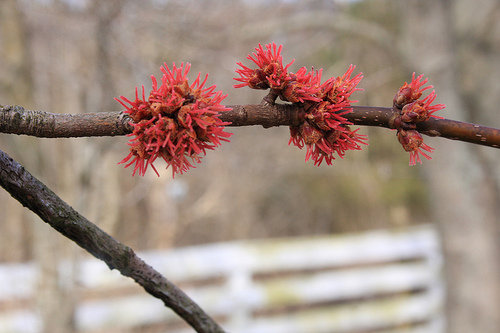
Flowers of the red maple, Acer rubrum.
(*photo credit)
April 1, 2011 Listening
and Discerning God's Voice
God
speaks to us in varied ways. Believers are aware of this as part of our
journey of faith, an attentive journey. We have more than a single calling and
we can get fooled and follow false voices if not attentive. All Fool's Day
is a perfect time to reflect on God's communication to and with us, for we want
to be faithful. We hear all sorts of voices and sounds out there, the noises
of the world. Yes, God speaks in varied ways, and so discernment through
prayerful listening is of utter importance.
We
must be attentive. We do not want to be like spoiled children who are
impatient with a distraction from our busy life. "Okay, God what are you
saying?" There are many competing and alluring voices out there; and we have to
discern God's call. We may be like Samuel in the Old Testament, who mistakes
God's voice for that of Eli. However, the voice may come in unexpected ways
through flowers or birds or scenic views; it may come from humble people or in
a speech or homily, or even a dramatic performance; it may be a failed test, or
a doctor's examination with a tell-tale diagnosis; it may be the soft comfort
at a moment of desolation or sorrow -- or that of joy and happiness. Only an
attentive listener can hear when the voice calls to us to change or modify our
journey of faith. We may be called to suffer, to serve others, to avoid
something or someone, or to be prepared for the final ordeal.
We
discern so as to make a correct response. The critical issue is not that we
are called, for God constantly calls, or even that we discern that it is the
divine call. The issue is our response that can be subject to our modification
and excuses. Yes, God calls us but pride or greed enters in to change the
degree of our response. The evil spirit can fool us and so we may need
assistance from a spiritually astute friend or a retreat director or, better
still, from a regular spiritual director. Quality response time is critical.
Small matters require daily or weekly quiet prayerful moments; major decisions
require more time and the silence that comes with breaking away from routines
and the tyranny of connecting devices (phones, TV, Internet and personal
interaction). For some people the demands of life do not allow them to get away
-- but they should be assured that under unusual circumstances God provides.
We
respond in our own way. Calls are heard and require our ongoing attention
and our examination and testing. People respond in different ways, for we are
all unique. For some of us, the response is definitive and there is no turning
back, as in Mary's response at the Annunciation. At other times, the response
occurs over a period of time, as when the person senses the need for a gradual
change. The Lord is merciful. Often for those needing time, they also need
assistance to see the way.
Prayer:
Lord, help us to hear, listen and discern. Allow us to be sensitive to others
who have difficulty in their journey in faith -- and make us see our assistance
as part of our own calling.
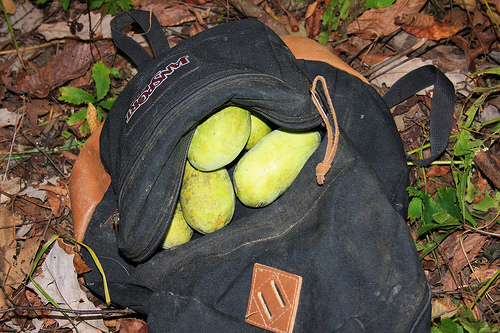
Pawpaw harvest.
(*photo credit)
April 2, 2011
Varying Food Tastes on a Daily Basis
As we launch into
springtime, we may be moved to venture into the frontier of new food tastes. We
ought not let the food industry fool us. We can prepare our own food, often
better than the expensive commercial preparations from pricey food factories.
Let's use the kitchen, and the herbs and spices we have on the shelf. It is far
more economical and add quality cooking time.
In 2009, I prepared a
different soup every day of the year, each with its unique taste -- and most
were quite good. In a dozen rare cases I took soups from restaurants or at
homes when visiting. I did not go into detail as to how long to prepare soup or
what spices and herbs I added -- in fact, impulse was part of my guide, for it
makes cooking a form of creative improvisation like that of expert jazz
musicians. Learn to enjoy being creative. You are allowed to stray from the
exquisite tastes of orchestrated cookbook soups or the haute cuisine of mother
France. Maybe it is the true French touch -- for new soups await creation.
In
2010, I changed from soup and performed a similar feat, and prepared different
salads, or on rare occasions accepted the salads of restaurants, homes,
churches, or herb club potlucks. As with the soups, well over 90% of the year's
365 salad varieties were my own concoctions. Again, creativity is called for --
and this allows new tastes to be experienced. Cookbooks have their place, but
not for me. I am sure this resulted in a certain disadvantage, for reproducing
the same creation a second time is difficult. One thing for sure: it is easier
to produce new salads than new soups.
In
2011, the emphasis shifts from suppers and lunches to breakfasts, and I am
trying 365 different ways to prepare and use old-fashioned rolled "oatmeal" in
some format. As I did with soups and salads, I am not excluding meat, but
simply not emphasizing it, since I do not include meat on my grocery list. I
prefer not to call myself a "vegetarian," for that makes it difficult when
eating with others. Limiting meat eating to rare occasions seems more
appropriate for a poor person who eats what is served or available.
What
is magic about "365 varieties?" Nothing -- this is the number of days in the
ordinary (non-leap) year. Why every day different? In part it is to
demonstrate that people CAN live on a poor person's budget (three dollars a day
in America) and have variety at the same time. Do we really need expensive
foods for a higher quality of life? Do we have to import exotic foods from
other countries, or choose out-of-season foods in order to have variety? Be
creative; be economical; enjoy a high quality life. Grow or buy local foods in
season, and donate your food budget surplus to help feed the less fortunate. It
makes more sense. Will the leap year 2012 bring 366 new food creations?
Prayer:
Lord, teach us to be food-sharing people and to do this with enjoyment on the
part of all.

Green frog, Rana clamitans.
(*photo credit)
April 3, 2011 Being
Radicalized by a Gospel Passage
On
this fourth Sunday of Lent, Laetare Sunday, we come with a sense of joy,
no matter how hard the life we are called to live. We read in John's Gospel
(Chapter 9) the story of the man born blind. This passage of Scripture
impressed me more than any other in my novitiate days. Why this one?
First,
in this Gospel Jesus seeks various commitments of faith from ordinary people:
Nicodemus, the Samaritan woman at the well, the blind, and Mary, the sister of
Lazarus. In this case of the blind man, Jesus heals the fortunate person, after
asserting that the victim's blindness was not the fault of something he or his
parents had done. Jesus heals by using the simple things of Earth -- namely, a
paste of spittle and dust. Jesus calls the healed man to do something in return
for the gift of sight, to wash in the pool of Siloam. Furthermore, there is a
follow-up in which Jesus gives the healed man encouragement for the difficult
life ahead.
Second,
the honesty of the unnamed man with new sight. That honesty involves bravely
standing up against all obstacles to declare his allegiance to Jesus the
healer. The cured man lacks support from others, even fearful parents; he is
courageous individual and speaks the plain truth to a hostile established
system; he is now both physically and spiritually insightful, even though
ostracized and abandoned by others; he affirms his faith in Jesus and thus is
thrown out of the synagogue. This means being expelled from one of the
tolerated religions of the powerful Roman Empire. In essence, as a follower of
Jesus he becomes an outlaw, lion's bait for the Empire's spectators.
The
third reason for my preference for this passage is that in following Jesus
thoroughly we need to be radicalized; that is, come to the roots of what we are
called to be and do. The cured man is a first example of an activist whose
faith leads to his being marginalized, while others, even loved ones, fail to
support him. The difficult calling -- to follow Christ -- impressed me then and
now. It is the difficulty as expressed by Franz Zaggerstadder in refusing to
fight in the Second World War, and that of Joan of Arc (see March 2, 2008). In
accepting the more radical approach, we join a community of faith that goes back
two millennia, and on which embraces some brave souls in a variety of
circumstances.
Last of all, our radical
witnessing must be one of joy in being and doing what the Lord wants us to be
and do. Our joy in mid-Lent's spring glory of new flowers and budding trees
extends to all creatures. Peace of soul as expressed in this rejoicing is found
in the man born blind, one who goes from not seeing to a person of faith willing
to accept all consequences.
Prayer:
Lord. help us to become deeply radicalized in our faith, and to be willing
to do what it takes to change economic, social, and political systems so as to
heal our wounded Earth.
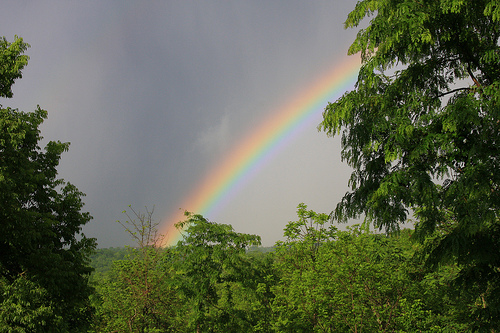
Brilliant rainbow after spring shower.
(*photo credit)
April 4, 2011 Noticing
Climate Change-Related Weather Events
A
climate change discussion is often a red flag. In reviewing the recent course
of events, we find that extreme weather events happen, and the unexpected
becomes the expected. In the past two decades we have experienced extremely
warm weather and dramatic weather-related events, namely, hurricanes, droughts,
floods, multiple heavy snow storms, and forest fires, as well as unrelated
events such as earthquakes and volcanic eruptions. Actually, the year 2010 had
one of the worst hurricane seasons in the past century --but most of the storms
spent themselves out in the oceans. We went through another bad winter in many
parts of our country, and costly floods in Pakistan and Australia. According to
NASA reports, the year 2010 tied with 2005 as having the warmest global surface
temperature on record.
Last
year there were 950 severe weather events in comparison to 785 over a ten-year
average. See <SustainableBusiness. com/ index.cfm/news. display/id/21666>. In
2010, we witnessed severe natural disasters as well: earthquakes, first in Haiti
with a quarter of a million deaths, and over a million left homeless; other less
costly earthquakes occurred in Chile and New Zealand. Besides floods and
earthquakes, uncommon drought and forest fires occurred in Russia; many people
suffered from very hot conditions during the summer. About one million victims
still live in very temporary conditions in Haiti and have had to endure periods
of heavy rains; a cholera epidemic has followed resulting in over four thousand
deaths.
Human
suffering and loss of life are becoming common in today's troubled world. In
2010, the world's leading insurer, Munich Re, estimates that the
financial cost was $130 billion, whereas it was $50 billion in 2009. However,
these financial costs vary depending on whether hurricanes, tornadoes, and
floods strike heavily populated areas --as in the Katrina episode and the Gulf
coast in 2005. In fact, for the greater part in 2010, heavily populated areas
were spared extreme natural events. The widespread damages only show how much
the potential for greater losses might be in the coming years if rising ocean
temperatures and more moisture in the atmosphere result. Recently, one study
predicts that heavy rains in California could cost the state hundreds of
billions of dollars.
Can
we do anything about these possible upcoming events? Individually and in small
groups we can prepare for disaster conditions, as mentioned earlier this year
(February 17, 2010); we can build more hurricane- or earthquake-resistant homes
or avoid building in flood plains; we can have community alert systems to warn
of possible tsunamis; and, if willing, we can ultimately take positive steps to
reduce climate change.
Prayer:
Lord, help us be aware of the signs of the times. Let us remember the large
numbers of weather-related victims, and inspire us to take positive steps to
address climate change.

Emergence of fresh mushrooms after period of April showers.
(*photo credit)
April 5, 2011 Trusting
Scientific Evidence: A Global Crisis
Early this year a Rasmussen
poll showed that 44% of Americans believe climate change is caused by natural
"planetary trends," while 40% of Americans say climate change is caused by human
activity. There is a dramatic reduction in the latter opinion in the past
decade. Why so? The proponents of irresponsibility, especially the promotion
groups for Big Energy, have been quite successful. In the middle of the
twentieth century, industry groups like these cast doubt on the ill effects of
smoking tobacco; the resulting procrastination earned hundreds of billions of
dollars in profits for Big Tobacco before the public accepted the inevitable.
Is history attempting to repeat itself?
Amazingly,
in the wake of 2010 being one of the two hottest years on record, we begin to
see what legislative gridlock is occurring over the causes and possible
solutions of climate change. It's possible that proof as to causes will only be
conclusive after immense damage has occurred, long after our passing. However,
that could be precious time after Big Oil and Coal have made untold profits from
the marketing of more fossil fuel products. Just before the 2009 Copenhagen
climate change meeting, European developed nations considered the debate to be
over, and that human causation for climate change was established. However, the
propaganda mills continue, and so today a majority of Americans want to believe
that we are not responsible for what is happening.
We
are witnessing continued battles over a balanced approach to climate change
legislation. Local and state governments have some power to make changes but
can hardly afford innovative programs with their acute money shortages and
crippling debts. On the other end of the governmental spectrum, the United
Nations has potentially effective global programs but does not have the power to
implement needed innovations. The attention then turns to our own and other
national legislative bodies.
Legislative paralysis is caused by striving to satisfy all powerful political
and economic interests. Unfortunately, compromises involve minor changes that
avoid the more difficult changes that reality demands. Most people know that
rising oceans and melting glaciers will occur after they are gone. That will be
their grandchildren's struggle, not theirs. If what they want to believe that
climate change is caused naturally, then their message to the grandkids is
"prepare for troubles." If prudence dictates that we regard ourselves as a
possible cause of climate change then we have a present, not future,
responsibility to correct misdeeds. Today's world does not want to admit we
cause any misdeed --sin or otherwise. The prevailing philosophy is to avoid
responsibility and continue present patterns of consumption, such as the
spacious home, large car, and jet travel to vacation spots.
Prayer:
Lord, teach us to see the needs of our day, and to know the signs of our times.
Help us take responsibility for the deeds we do and the consequences of our
actions.

A grandmother's rose.
(*photo credit)
April 6. 2011 Recording
Our Ethnic Diversity and Change
The August 11, 2009 daily
reflection involved "American Ethnic Change." With valuable assistance from
Janet Powell and Mark Spencer along with a number of volunteers over the years,
we have created an Ethnic Atlas of the United States with 2000 census
data. Now we are incorporating data from the 1980 and 1990 censuses as well as
including data from the 2010 ancestry and racial census data. This is currently
being processed on both a 50 state-by-state level and the 3,000 plus
country-by-county basis. With sets of maps from each of four censuses we intend
to show changes along with color-coded primary ethnic group per county. The
1980 set of maps show traditional concentrations of ethnic groups; the 1990 set
includes 120 ethnic museums and centers that celebrate specific or mixed ethnic
groups; the 2000 maps include every ethnic group with 1,000 or more specific
groupings such as German or Italian (over 25,000 entries); and the 2010 maps
will highlight ethnic changes in counties over the four census periods.
Knowing
our American ethnicity helps us appreciate our diverse cultural practices.
Ethnic differences invite us to practice tolerance and respect for our
neighbors. Smaller language groups are more inclined to forsake their cultural
differences and become what they regard as more homogenized or "American"-- but
this can be a mistake. The impulse to become more American tempts second
generation people to distance themselves from parents. However, third and later
generations tend to move in the other direction -- people desiring to know their
cultural backgrounds and the lands of their ancestors. Many are seeking to
reestablish their roots through genealogical research, return to lands of their
forebears, and by recording the elders' stories when possible.
Immediately upon arrival in
America, new immigrants are more inclined to cling to ethnic clusters. With
time and cultural integration, their children are less inclined and lose contact
with the "old country." Parents die, ethnic social societies erode, and youth
find more exciting things to do than to dress up in native costumes, learn
ethnic dances, speak quaint languages to grandparents, and attend specific
celebrations. Ethnic churches and parishes that were so prevalent in the early
twentieth century tend to be merged or closed as succeeding generations move to
the suburbs and become more "American."
Our
country continues to be fed by immigration. Spanish is rapidly becoming the
second language of our country, and this is slowing traditional patterns of
assimilation through a rapidly growing transplanted Hispanic culture. In
contrast, many people, especially the English or Scotch-Irish, declare
themselves to be "American" or non-designated. Succeeding censuses show "Anglo"
groups are decreasing while minorities, especially Hispanic ones, are increasing
through natural population growth and immigration.
Prayer:
Lord, help us to know and appreciate America's ethnic diversity and change.
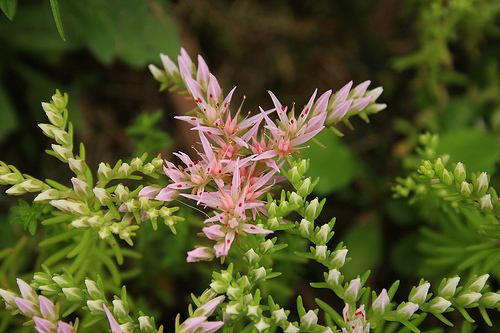
Sedum pulchellum, native Kentucky plant.
(*photo credit)
April 7, 2011
Global Sharing Is Healthy
If
only you would listen to him today, "Do not harden your hearts as at Meribah..."
(Psalm 95)
On
this World Health Day we need to consider the health that comes through
sharing resources -- not unilateral giving or taking, but through an interchange
like our covenant relationship with God. Sharing is more healthy than merely
giving or receiving. It is the response to the God who calls us. God speaks to
us in those who hurt -- whether close at hand or distant Haitians and others who
need the necessities of life. Hearing the pleas of others and striving to
respond by actual assistance is a necessity for our own salvation. By listening
well we can initiate an exchange that has practical significance for all parties
involves. Others need the essentials of life; we need the prayers and
solidarity that come through sharing with the poor. The networking and
resulting actions are part of global security and health.
When
we fail to listen, or become occupied with peripheral issues, sensitivity
erodes. A hardening of hearts comes through failure to listen, and softening
results from contact with the poor. This is why people with surplus can give
and give, and still not do so out of love. Good motivation can become the
exercise of the power to dictate how to use a gift, and to whom it should be
awarded.
Love
is the sharing act, and thus it calls for reciprocity. Sometimes, healing the
sick or repairing social injustice demands that we give before we seek to
share. However, if nothing more, at least we can ask the receiving person to
pray for the giver. Requests for prayers become opportunities to share,
because the prayers of the poor help us to hear and respond to the God who calls
us. Our loving God offers us pure gifts even when we fail to seek help, or
respond in crude ways. To the degree we are willing to share our gifts with
others, our responses are purified.
This
brings us back to World Health Day. The greater moments are not acts of
giving but of sharing. That is more healthy. If some grab world's resources so
that they can distribute them more wisely, this still is a matter of power being
exerted on another. They become insensitive to what the poor have to give.
They cannot take the risk of the poor demanding, and taking steps to retrieve
the commons that is rightly meant for all. Mother Teresa was moved to share
love with the poor; all of us must try to do the same. By listening to the
voice of God speaking through others, we are able to prepare ourselves for a
proper exchange of love.
Prayer:
Lord. teach us not only to hear your voice coming in many and gentle ways, but
to listen carefully and respond through acts of love for and with others. Help
us to move from acts of giving to acts of sharing.
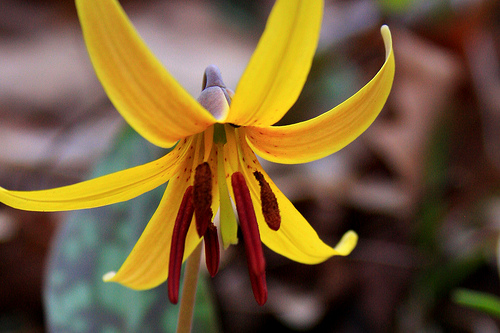
Yellow trout lily, Erythronium americanum.
(*photo credit)
April 8, 2011 Discerning
Use of Land for Food and Biofuels
As
people concerned about our wounded Earth, we are faced with two possibilities:
use arable land to grow food for the hungry; use the land to grow materials
that can produce cellulosic ethanol to furnish liquid fuel for our vehicle
fleet. Are these clear-cut options? Are the optimists correct in saying
sufficient land exists for all -- edible crops for a billion hungry people and
fuel for hungry vehicles facing possible petroleum scarcity?
Optimistically
speaking, a report was released in January in the technical journal,
"Environmental Science and Technology," saying that there is enough land
available on this planet to produce grass crops for cellulosic biofuels with
minimal impact on agriculture and the environment. After subtracting grasslands
used for pasture, the report says that there are 1,107 million hectares (a
hectare is 10,000 square meters or 2.47 acres) or enough land available to
produce 26 to 56% of current global liquid fuel needs.
Pessimistically
speaking, the amount of land needed to satisfy transportation fuel needs
makes us pause. Isn't a better approach trying to meet fuel demands by
increasing fuel efficiency? Over two-and--one-half billion acres at full
production might only meet one-quarter to one-half of global liquid fuel needs?
Aren't these fuel demands expanding when millions of Chinese, Indians, and
others enter the middle class and its auto-buying tendencies? An added
question: How much of this enormous expanse of grassland, and possibly forest
as well, will be taken from natural habitat for wildlife, such as the
orangutan? Granted, electric vehicles such as the GM's Volt and Nissan's Leaf
are fueled by plugging into an electric grid that includes increasing amounts of
renewable energy sources such as wind and solar.
Realistically
speaking, the production of biofuels from cellulosic materials is still
little more than the question President Bush made when preparing his 2004
State-of-the-Union message, "What is this switchgrass?" Well, it is a distant
hope for drivers who want to operate their individual vehicles until the oil
runs out, and beyond. The federal government had great hopes, and first
projected 100 million gallons of ethanol from the grasslands crops in 2010, but
then pared it down to 5 million; however, we did not see a single drop last
year. However, a sizeable portion of our American corn crop was turned into
biofuels for fuel guzzlers. In fact, this past year the price of global food
staples began to rise as did petroleum costs, and that means a billion people
continue to face food insecurity and escalating prices. The desire for biofuels
might be good for corn-state farmers and ethanol producers, but it is terrible
on people who have to expend 60 and 70% of their incomes on food.
Prayer:
Lord, teach us not to play games with the resources of this world. Help us to
see that our days are numbered, and we will have to face God's judgment,
reminding us that we have failed to feed the world's hungry.

Country eggs, naturally colored in tans, greens, and white.
(*photo credit)
April 9, 2011
Keeping Easter a Non-commercial Celebration
There
are only two shopping Saturdays left before Easter and it may occur to us to buy
Easter decorations, presents, cards, or gifts. Why? Because most of us are
reminded to buy in a blizzard of ongoing advertising. What is it, 35 hours of
TV a week for the average viewer, with 12 commercials per hour -- or almost
22,000 in a normal year -- encouraging a constant buying spree? To be sure,
most commercials in all forms of the media pertain to inducements to purchase
something. So, when a special event like Easter comes, those bombarded with
commercials reach for the shopping list. Must we succumb to this temptation, or
can we make this a major spiritual occasion with little commercialism?
Alternatives
to material things are in order, for Easter is not as commercialized and
secularized as Yuletide, when the Japanese Christmas salutation is, "Jingle
Bells." Yes, Halloween has costumes, face masks, plastic pumpkins, and
trimmings; Thanksgiving has its cards, turkeys, and launching of the holiday
buying season; Valentine's Day omits the prefacing saint's title, and its cards,
candy, and flowers are alluring. What is it about Easter even amid chocolate
bunnies, colored eggs, and new clothes that exudes a general non-commercial
spirit?
Easter
egg hunts -- This is a traditional event enjoyed at homes, clubs, churches,
and schools. It can become a secular teaching occasion, that is, to teach
youngsters that the one who is fastest, boldest, and able to run over others
will get the most. Instead of this awful approach to grabbing things, why not
count out the number of eggs and divide by the number of hunters of all ages;
tell the kids how many each may ultimately collect, for there are limited
resources in this world; now have the older ones team up with the younger ones
and assist them in getting their proper share and only that amount (no
exceptions); now let the younger team member "assist" older children retrieve
their proper share.
Personal
greeting cards -- Easter is a time of joy, and so personal greetings have a
high place. No one can deny that a beautiful card or a bouquet says much to a
shut-in or ill person. However, a personal visit, phone call, email salutation
or hand written letter means much more. Add a smile or even a little personal
gift, if that seems proper for the occasion -- and maybe make it something that
has religious relevance.
Living
plants -- Some people insist on giving gifts and that is still okay, given
the propensities of givers, receivers, and circumstances. Since Easter comes in
springtime in this hemisphere, potted flowers or transplantable herbs may have
special meaning as a substitute for the expected cut-floral bouquet. Home-grown
daffodil bouquets are fine as well.
Prayer:
Lord, Easter is coming soon and our thoughts ought to be on what to do
significantly for our loved ones. Help us make a gift list of non-commercial
items with spiritual significance.

Daffodils from the garden.
(*photo credit)
April 10, 2011
Discovering Christ as the Resurrection and Life
I am the
resurrection.... (John 11:25)
As we approach the passion and death of the Lord, we recall that chapter eleven
of St. John's Gospel is often used in funeral homilies. Believers seek to
discover Jesus as the center of new life, and then try to make ourselves
imitators of him in order to serve our neighbor.
Christ,
as resurrection, our guide, and our teacher:
the
road map for our journey of faith;
the gate of heaven and
access to God the Father;
the path to the Father
(John 1:18; 12:45; 14:9);
the way of the cross;
the venture to save
others;
the passage into the New
Covenant;
the opening to future
glory;
the compass of our
intellectual pursuits;
the answer to our
constant questioning;
the faithful witness to
the Father;
the eternal Word made
flesh;
the Good News proclaimed to
all creation;
the personification "in
spirit and truth" (John 4:23);
the pleasure of the Father;
the Suffering Servant;
the High Priest;
the Good News living
with us;
the God within; and
the Bread of Life.
We as resurrection and
healers to others:
witnesses to Jesus
among us;
co-sufferers through
compassion;
bearers
of Good News;
members of the Body of
Christ;
givers of encouragement
to the discouraged;
enthusiastic bearers of
the God within;
spiritual lights in a
darkened world;
travelers on the
journey of faith;
examples of joy and
love;
opportunities to assist
those in need;
friends of the
marginalized and oppressed;
sharers in the divine
family;
consecrated people;
reclaimers of the
commons;
living testimony to
God's love for us;
ways to draw others to
Christ;
providers of bread to
the hungry; and
healers of our wounded
Earth.
Prayer:
Lord, as we approach the Calvary event, make us all the more willing to
enlighten others and share with them in their sufferings. Make our service part
of your resurrection event.

"Social" networking.
(*photo credit)
April 11, 2011 Benefiting
from Social Networking
People
ask us whether we read their blogs with an expectation that their current
conversations are being shared with us. When we hesitate, we resolve to include
more people on our contact list, for these bloggers are pleading for further
communication. I used to restrict social contact severely for lack of time. Is
that proper, for it is an admission of not having time to listen? Just how much
do we value social communication, whether by phone or letter or personal
conversation -- or interaction on the Internet through emerging social contact
networks? Maybe I am in the world's minority without a cell phone, but I do
make landline phone calls and use email and postal letters for social contact.
Emergency
occasions. Honestly, I detest seeing people constantly chattering on cell
phones while driving, or in restaurants, or sitting beside me at airports or
waiting rooms. Chatterers can be unwanted noise-makers; they can infringe on
our silent space, a zone extending to some indefinite distance. However, the
need to be connected is one of the great benefits of social contacts -- and many
take advantage of it. Yes, lacking a cell phone can be a detriment when real
emergencies arise, and calling 911 can save lives. Do I depend on others'
immediate contact devices, like smokers who bum rather than buy cigarettes.
Isolation-breaking
situations. Quite a few people need to be in contact with others, more than
we imagine is necessary. Some are simply afraid of silent space like being
afraid of the dark; others have to satisfy their loneliness here and now. Some
twelve hours of information intake per day is not sufficient; for them something
more meaningful is sought to break the curse of their own isolation. We need to
help break this isolation to some degree, for these folks miss the benefits of
village get-togethers, post- church-service chats, and the backyard and front
porch conversations among neighbors. As the world becomes smaller,
neighborhoods change in character but the need for social contact remains.
Humans resemble other animals who like to congregate among their own; maybe we
are called to help provide togetherness.
Exchange
opportunities. In previous times, when publishing was limited to a few of
the more fortunate and well-placed intellectual and vocal elite, many found
economic barriers to circulating their own ideas. The social contact networks
are allowing for circulation of current ideas, whether from those who think
thoroughly and yet are marginalized, or from those who do not communicate freely
but still have good things to say. A democratization of ideas allows for
germination and corrective measures that enhance the creative juices in a
free-flowing conversation. This is different from gossip and meaningless
chatter, but worth encouraging as part of social interaction.
Prayer:
Lord, help us be discerning enough to spread the Good News through proper
occasions, situations and opportunities. Inspire us to use our precious time
wisely in such communication.
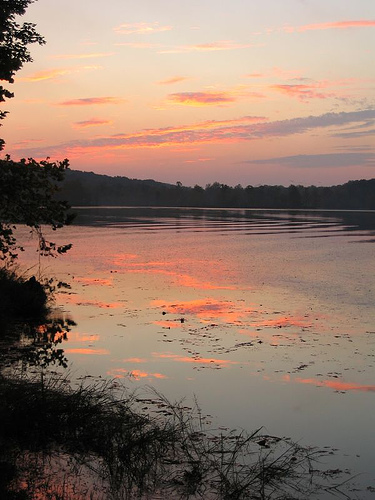
Energy Lake, near Cadiz, KY.
(*photo credit)
April 12, 2011
Telling the Last Civil War Story
On
April 12, 1861, one hundred and fifty years ago, the American Civil War, the
most monumental struggle ever to occur in this hemisphere, started with gunshots
at Fort Sumter. No living person remembers that fatal day, but an
ever-more-rarified segment of our population has known someone who lived at that
time. I happen to be one of these, for the Civil War reality was marked by an
eyewitness, our neighbor Joe Davis. He lived in this border state with family
loyalties divided, brother against brother.
Ole Joe Davis was
approaching ninety when I was eight decades younger, but he was my age when the
Civil War started in 1861. On that crisp and sunny April day, Joe's dad took
him to the Mason County campgrounds, for his father was one of those being
mustered into the Kentucky Home Guard. The assembling citizens elected their
leader, Colonel Charles Marshall, a direct line within that illustrious Virginia
family that included Chief Justice John Marshall. That colonel's living
granddaughter-in-law tells me that the land of the mustering could have been
their farm, for over the years a multitude of military uniform buttons have been
found. However, Daddy said that Joe Davis told him the first gathering occurred
a mile away at what we knew as the "Old Country Club."
As kids we would see Ole
Joe, our next door neighbor, shuffling at an extremely slow gait with his classy
straw hat and walking cane. The time it took him to cross the road to reach our
house was sufficient to alert Mama who was always busy; thus she gave us kids
the task of entertaining him. She did not like him calling her "Lizzy,"
although her name was Elizabeth. Well into her nineties when her memory was in
short supply, I asked her who called her Lizzy and without hesitation she
shouted "Ole' Joe Davis." I told her I discovered in research that it was Joe's
mother's name, and his calling her Lizzy was a sign of endearment -- a fact she
could not comprehend in old age.
We
kids were to entertain and be entertained by Mr. Davis' many stories and astute
observations about weather, crop-growing, and when times were really tough,
namely during the Civil War years. Joe's daughter Edith told neighbors that her
dad's family kept two sets of money (Union and Confederate) should Morgan's
raiders reappear, or the fortunes of war bring in the Union army. Joe's dad was
a slave-holding Unionist, a strange combination from today's perspective, but
common in Kentucky during that period.
Joe
Davis' stories were either told directly to us kids, or to Daddy who retold them
over the years. Ole Joe left his mark on all of us before he died in late
1943. For one, he made me into a storyteller, a fact that made me confess that
I "told stories." Why so wrong? Because Kentucky stories are often stretched,
even though Daddy could tell stories over and over without changing them one
iota. Mine had more elasticity -- and my Civil War ones are a little more
stretched. However, I can vouch that Joe lived through the war. Exact details
are subject to years of embellishment.
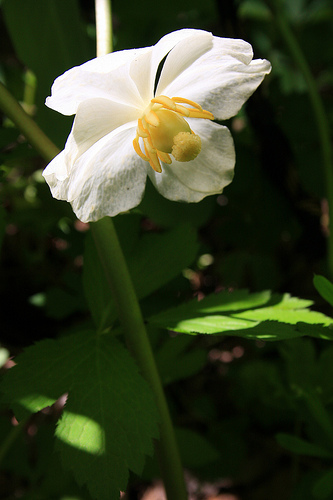
Mandrake, Podophyllum peltatum.
(*photo credit)
April 13, 2011 Trimming
the Obscene Military Budget
On
the birthday of our third President, the sometimes frugal and consistently
non-federalist, Thomas Jefferson, we should consider tough calls for restricting
our military spending. Our Tea Party and debt-hating legislators need to be
persuaded to perform comprehensive military budget reviews. In January,
Secretary of Defense Gates proposed that about $78 billion be cut over a
five-year period from programs regarded as inefficient, along with 45,000
associated military jobs. In 2010 Gates had already proposed to cut one hundred
billion dollars, but as savings to be applied to other areas of the military.
Enough is enough!
The United States has assumed
the superpower role of policeman of the world -- and the duty/honor/distinction
is proving quite costly. Over $700 billion, or 56% of the discretionary funds
of our annual federal budget, is going annually for defense purposes; that is
more than the entire military budgets of the rest of the WORLD combined. Need
we continue such extravagance until our nation is bankrupt? Part of the impulse
by legislators to continue funding, and expanding that funding, is the perceived
pressure by constituents to be fair to our service personnel; part is the
immense pressure from the military/industrial complex that seems to have
captured our American treasury's purse strings.
G.
Adams and M. Leatherman, in an article in the Jan./Feb. issue of Foreign
Affairs entitled "A Leaner and Meaner Defense" (pp. 139-158), list specific
savings that could lead to greater security if applied to global food insecurity
and unemployment. The reasonable savings are not peanuts -- and we as an
irritated citizenry ought to awaken our legislators. Among specifics the
authors propose limiting across-the-board annual pay increases to two years,
thereby saving $40 billion between FY 2012 and FY 2018. During the same period
an additional $48 billion saving could accrue by disciplining the health care
system for working military retirees and dependents (TRICARE), and another $60
billion by reforming miliary retirement saving plans. Removal of intelligence
gathering and security procedures could add an additional $120 billion in the
period. A 19% reduction in total personnel, coming mainly from
adequately-defended Europe and Asia, could result in $166 billion between FY
2012 and FY 2018. Cutting unnecessary, outdated and overly expensive military
hardware and programs such as the $260 billion F-35 Lightning II could add
savings.
Canceling
five hardware construction and research programs could yield $164 billion over a
five-year period. Exposing the military-industrial complex's appetite for
defense spending, which President Eisenhower warned against in his farewell
address fifty years ago, is an eye-popping exercise. If we leave the world of
security fiction for reality, can we reduce this sacred cow? An aroused
citizenry should not fail to call for frugality.
Prayer:
Lord, help us bring down the idol of the military establishment and share the
savings with a world in real need.
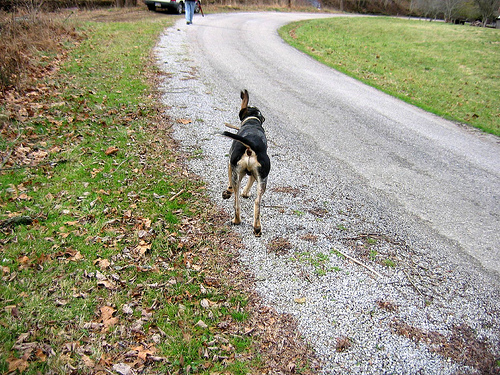
Running to greet beloved owner. Boyle County, KY.
(*photo credit)
April 14, 2011
Appreciating Roads for Their Blessings
In April each year,
road-building crews become active and we start dodging them as they patch winter
potholes and repair guard rails. Snow equipment has been put away until late
autumn. Builders are widening streets, constructing bridges and rest stops, and
resurfacing areas damaged by road salt used during severe winter weather.
Well-maintained roads are needed to take us to distant places; they are the
artifacts of politicians, engineers, and builders cooperating with the lay of
the land -- Earth's terrain. Our roads are needed for human travel and for
commerce; they break the isolation that can bind people too tightly into their
own communities. Road are thus liberating in many ways.
Highways
bring us back through history to those first master road-builders, the Romans.
The Empire's road system was a masterpiece in early engineering, and these have
in some cases been used for centuries. The bridges, types of pavement, drainage
ditches, arched viaducts, and even rest areas were well ahead of their times and
built to endure. While most bulk commerce was cheaper by rivers and seas, still
the good road network allowed for postal service and human travel. However,
even with superb construction techniques roads did deteriorate through lack of
good government, constant vigilance and ongoing maintenance.
Today, we take our roads
for granted; we measure distances by time rather than mileage. Drivers are
often in a hurry and strive to shave minutes and seconds during routine trips.
However, modern roads invite higher speeds and in some cases tragic results.
With the snowy season behind us spring brings on added speed. As a toddler I
recall the Wood Lane, a mud road that bordered our farm and is now a two-lane
highway. We (Mama and a car full of infants) went to visit her aunt; the Model
A Ford got stuck in the mud, and she had to walk to a neighbor farmer and get
him to bring his horse team over to pull us out. That was the story of the
1930s when many of our farm roads went from horse-use to that of motor traffic.
Hardened surfaces called for road-building projects that yielded a national
Interstate network. These roads liberate the isolated, and yet isolate people
unable to drive.
I
travel on a relatively good two-lane highway between my two parishes. Local
people travel rapidly on this familiar route especially during morning and
evening rush hours. They travel at faster speeds when traffic cops are not
looking. On this road stretch I have seen several major accidents despite
enforced safety belt regulations. Even with good roads and driving practices
roadways are mixed blessings -- air pollution, consumption of petroleum,
congestion, excessive mobility, and noise. Skunks trying to cross even an
infrequently used rural road risk their lives. Likewise, roadways affect
wildlife migration routes. Nothing is perfect, and that includes highways and
drivers.
Prayer:
Lord, help us travel safely and with respect of others.

Great spangled fritillary, Speyeria cybele.
(*photo by Sally Ramsdell)
April 15, 2011
Living in the Boondocks
During World War II some of
the people escaped capture by the Japanese occupiers in the Philippines by
fleeing to the wilderness, the less accessible mountainous areas; these were
the "bundoks," a Tagalog word that has entered into modern American usage. In
fact, this has become a pejorative term, defined as "being outside of the
mainstream." However, in the last decade this meaning shifted from being an
area of land to becoming a human condition, as rural people throughout the world
are connected through better highway systems, Internet and cell phones.
I
would regard my own life of only a few years back as being "in the Appalachian
boondocks" by some people's measure. This came at a price and yet with
benefits. The price was not knowing all the latest fads and way of acting and
thinking with the late night television sense of humor. However, in part this
isolated situation was from NOT watching cable television or reading regional
newspapers. Now, it is not where I live (twenty-five minutes from the
Interstate System) but how connected I am at a given moment. I am fortunate to
have "broadband" Internet access that allows a connectedness denied to many of
our country's rural residents.
What
are the benefits of living in out-of-the-way places? There is less
congestion and noise, though most parts of the world have airplanes flying
over. We do have wilderness areas in which to take off time, and with a little
travel be far removed from other elements of civilization -- to hike for miles
without meeting other human beings. There is fresh clean air that many people
would treasure as promoting health and quality of life. There is the lack of
pretension by people who know they are not regarded as being "movers and
shakers," or of being up in front of everything. However, the greatest benefit
is that this is a deliberate choice made by escapees from areas of cultural
captivity. This is a restful place -- if escapes still exist. Living or
traveling in the boondocks can mean being removed from the temptations of the
fast life with all its stresses.
What
is the price of being in the boondocks? For one thing, those living here
(or "there" depending on viewpoint) are subject to being marginalized by
society, for the mainstream does not regard our living or our words as worthy of
attention. For residents outside of perceived boondocks, a pecking order of
importance is subscribed to, and this is insisted upon by those in the inner
circle of whatever power structure they define. In fact, they regard themselves
as deserving of special treatment because they are better targets for
terrorists. Urban areas are generally more favored for development. For many,
the "boondocks" are to remain less attended to -- and that may be good or bad.
Prayer:
Lord, teach us to be satisfied where we are and see benefits and problems
associated with any place. Help us make the best of what we have and to share
our benefits with others.

Water droplets on jewelweed (Impatiens capensis) give the appearance of
jewels after a rain.
(*photo credit)
April 16, 2011
Preparing for a Veggie/Floral Garden
Tomorrow
we start Holy Week and also Garden Week. It is a holy act of
praise to testify to the sustaining beauty of a garden where both vegetables and
flowers thrive. Some might want the flowers to predominate. I prefer the more
subtle approach of many veggies and a scattering of flowers, which give vivid
color to the sea of growing vegetables. The mix is important but allows all to
find their proper places. Do not expect to be furnished with a rigid set of
"dos and don'ts." Sorry for the disappointment, but it is better to follow your
own tastes and instincts. Regard flowers and vegetables as companions and make
them feel comfortable growing together.
If there should be a general
rule: become a garden artist with flowers acting as your paint. I discovered
this in 2010 in the year of the salad; Betsee, a keen herb club observer, asked
whether I was constructing my salads (especially with red beets or cranberries
or tomatoes) in order to maximize color combinations. That was inadvertently
true, and suddenly the quest for color becomes an issue worth more explicit
recognition. Hence, consider the veggie/floral garden as primarily one of
aesthetic tastes. Added color is meant to please the gardener and neighbors and
visitors. Without too much extra work, beauty adds quality to our life, and
this gives praise to our colorful God.
Flower
cultivation and admiration are a way a way to pray. This, like all reflections,
is meant to encourage and not to restrict your creative instincts. Consider
changing the landscape throughout the growing season. Make the garden a moving
montage, a never-exhausting change of scenery so that we can be greeted each day
with slightly different combinations of color and grace.
Do
you want me to tell you which flowers to select? There are hundreds to choose
from, and my favorites (irises, cosmos, begonias, marigolds, and lilies) may not
be yours. Select those that bloom at different times and need sun or shade,
depending on specific locations. Consider that some flowers attract butterflies
and others discourage them. An additional thought might be to choose flowers
that are higher on the menu of certain insect pests such as the Japanese beetle
(e.g., evening primrose).
If
you care to record your success in order to encourage other gardeners, take
photos at different times, from a special place at a certain day of each month.
This may assist visitors who only come by occasionally. Make the garden
something you are proud of, for it shares a message to the rest of the world
about the grandeur of God's creation. We enhance God's creation and thus
cooperate and share in the glory all around us.
Prayer:
Lord, accept our humble garden as a prayer of praise to you and to all the
vastness of creation. Let this small piece of land be a sample that has the
potential of a ripple effect on a damaged world -- a beginning to the healing
process.

Christmas fern (Polystichum acrostichoides) in April.
(*photo credit)
April 17, 2011
Proclaiming Royal Titles
Holy
Week begins with Palm Sunday, the day on which Jesus entered Jerusalem on
a donkey in royal fashion. Many of the bystanders were convinced that here was
someone who could lead them against their Roman oppressors; such were the ideas
of a shallow people with a narrow view of the world. They were wanting to give
Jesus a royal title, if he would only act in the limited fashion that they
expected. However, the divine drama of salvation was different, as would be
seen before the week ended -- and salvation history took a different turn, never
to fulfill their dreams. Furthermore, royalty itself would be conceived in a
different fashion; through the ages believers have given different royal titles
to Jesus. We are invited to reflect on them, for each tells its own story.
ROYAL TITLES
Word from the
Father's heart begotten;
Earth-bloom from
Mary's womb;
Light dispelling
gloom and doom;
Mercy's model
giver, New Hope awaken;
Good Shepherd to the
forsaken;
Sheep Gate for the
left-for-rotten;
Emmanuel to the
ne'er-do-well, forgotten;
Sacred Heart, your
nom de plume.
Sower, mower, white
harvest reaper;
Wind-blown, on
that blessed day;
Bearer of a Roman
lance parlay;
Cross-fixed with
thieves, True forgiver;
Grace-filled Flood,
Nature's river;
Holy Water,
Precious Blood, Gatekeeper;
Redeemer quiver, Hell
shiver, divine sweeper;
New Passover, pray
come, come we pray.
-----------------
The
"Special Issues" section is soon to have a listing of 365 titles for Jesus that
are all found in standard liturgical sources. There may be more titles that you
are invited to offer.
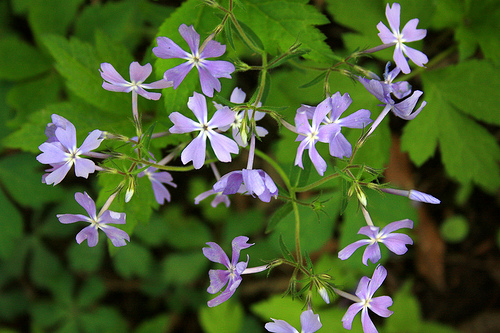
Common blue phlox, Phlox divaricata .
(*photo credit)
April 18, 2011
Contesting the Individual Right to Bear Arms
Patriot's
Day causes us to pause and ask, "Are people armed to the teeth really more
patriotic than others?" On January 12, 2010 we reflected on the right to bear
arms as stated in the second amendment of the U.S. Constitution. This is NOT
the right to have ammunition for automatic weapons. The January 8th Tucson,
Arizona, massacre was caused by a disturbed person who that morning bought an
enormous supply of shells for his semi-automatic weapon. Is this what
Constitution framers intended? The shooter should not have been allowed any
weapon and certainly had not the "right" to purchase a cache of ammunition.
Danger does not come from bearing a weapon, but from bearing a loaded weapon.
Why not a strict control on the ammo? In 1775, British soldiers precipitated
the American Revolution by their march from Boston to Lexington; they intended
to retrieve arms and munitions from a communal arsenal.
Americans talk about the
right to bear individual arms that many, even those of us who are former
gun owners, would consider as the communal right to bear arms. Limiting gun
possession by omitting persons with mental disturbance means that we Americans
regard this amendment as partly communal. In some states people are required to
take an exam for a license to bear arms. We have driver's licenses, so why not
for firearms as well? America has almost 300 million individual arms (about one
per person), and many of those from infants to seniors cannot use firearms
properly. At least, let's become strict interpreters of the Constitution: limit
individual gun rights to one shot muzzle-loaded muskets. Let's also keep other
weapons and ammo in a regional armory, or distributed among police and those
deputized in times of emergency.
All citizens need security;
this should not be confused with the sport of hunting with weapons. A crazy
person should neither store at home or even hunt with a weapon, yet regulations
in various states are lax. Right now in many places a "nut" can get automatic
weapons and ammo, with few or no questions asked. The American Rifle
Association has power, but this group seems to overlook that more Americans have
died from intentional or accidental shooting in the last three decades
(averaging 30,000 deaths per year) than in all of America's wars combined.
These killings were never conceived of by the 1787 framers of the Constitution.
Security
is not furthered by every individual being armed. The world, along with our
communities and homes, needs strict arms control, something that is hard to
achieve in our gun-crazy land. We read about Afghanistan's weapon saturation
after that unfortunate country has endured decades of civil strife. Let's ban
automatic weapons from general commerce, a first step to global and national
security.
Prayer: Lord, give
us the courage to advocate for arms control in our world and gun control in our
nation.

Taking a break from trail cleanup, Cumberland Gap National Historical Park.
(*photo credit)
April 19, 2011 Broadening
Nonpartisan Environmental Concerns
One
of my great disappointments is the partisan environmental movement that has
evolved since that first, highly nonpartisan Earth Day in 1970. On this
Hanging Out Day we strive to air out publicly the laundry we have just
washed -- and to air out grievances that divide our policy makers and cause
paralysis when it comes to current environmental climate change issues.
Today,
battles develop over capping and trading, that is, capping pollutants at
utilities and other industries and trading these with less polluting industries
-- thus giving an incentive to curb pollution through money transfer. This
approach has the disapproval of specific businesses that must pay, and also of
liberal policy makers who dislike turning environmental controls into a
capitalistic venture of winners and losers.
Partisan
rancor and angry voices have increased through the years to a point where they
begin to paralyze the environmental protection process. The United States, as
the major consumer of goods and the second- highest greenhouse gas emitter,
ought to take a lead, lest no general consensus on global climate change by the
major polluting nations is reached. On the national level we ought to focus on
four areas of nonpartisan cooperation:
Renewable
Energy promotion. Quite often in this series of reflections we mention
specific solar, wind, hydropower, geothermal and even some biofuels that could
lower our dependence on oil and coal, and help clean up the air and water and
reduce climate change. New jobs can be created in the process of building
centralized electricity sources, as well as encouragement of individual domestic
applications.
Nuclear
power issues. Nuclear power plants are too expensive and risky for private
promotion alone; thus the current call for massive governmental loans, insurance
and waste storage facilities. Those who wish to reduce the size of the federal
government and budget should take notice; they ought to team up with
anti-nuclear advocates and say "no" for different reasons.
Energy
and other resource efficiency. The move to omit incandescent bulbs
everywhere is a good first step. More can be done because this has popular
appeal and is good economics.
Promote targeted economic
growth: Trade agreements that support poor nations can benefit producers
everywhere. Promoting production of luxury materials for the affluent is not
economically healthy. Redistribution of wealth through fair taxes allows an
emphasis on producing housing, road and high speed rail systems, small farm
supplies, and materials for infrastructure expansion.
Prayer:
Lord, help us to see that the temptation to be partisan in environmental issues
cripples global efforts to control consumption and reduce pollution and waste.

Squaw root, Conopholis americana.
(*photo credit)
April 20, 2011
Working for Greater Food Security
Tomorrow
is Holy Thursday when we prepare to eat our liturgical meal together.
Let's not forget the food needs of people throughout the world, especially those
who spend two-thirds of their money on food and still watch food prices rise.
Perhaps half the world's population spend over half their income on food -- and
in severely food insecure regions as much as eighty or ninety percent. Even our
country has a sizeable minority who suffer from food insecurity about tomorrow's
meal.
Many
people have difficulty obtaining nutritious fresh fruits and vegetables.
Currently such shortages are being experienced in emerging nations, e.g.,
cabbage in China and onions in India. Food shortages for the poorer portion of
the population are even more distressing, especially the rising prices of corn
and rice, basic staples for life. This can be a life-and-death situation. The
ones who endure such conditions are our brothers and sisters, for we are one
family and must conceive of ourselves as such, for their welfare and our own
salvation. Food security can be enhanced in a number of ways mentioned
recently:
*
Global food-storage banks that are pest-free, and with food supplies at the
disposal of aid groups during times of famine;
*
Enhanced programs for improvement of small farms in emerging countries through
access roads, proper irrigation systems, improved seeds, and available
fertilizers and farm implements;
*
Promotion of reduced meat consumption, and avoiding the conversion of grains
into biofuels for use by developed nations;
*
Improved trade relations among food-producing and consuming nations, and halting
arbitrary food embargoes in times of food shortages due to floods and other
weather- or human-caused disasters; and
*
Reduction in wasteful food practices in developed nations so that more food is
available at lower prices in other parts of the world.
Bringing
all this about could be regarded as a combination of personal austerity
practices (only rarely widespread enough to make a major difference) and
regulations imposed on all. The looming food crisis is part of a
disparity-of-wealth problem. Some people are able to use resources as they
please because they have wealth and power; others must endure increasing
shortages because they are poor and powerless.
Prayer:
Lord, teach us to see our responsibility to food supplies in two ways: to act as
responsible individuals in daily eating practices; and to see our civic duties
as helping to change global food practices, so as to result in fair food
distribution among all people.
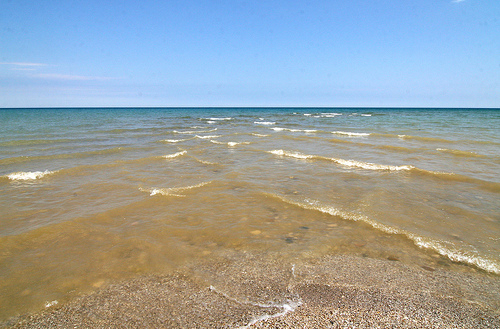
Waters of our beautiful planet.
(*photo credit)
April 21, 2011 Holy
Thursday: Consecrating Us to Serve
We begin the Triduum before
Easter Sunday in a somewhat non-traditional manner. We will look at the spirit
of each of these three days as a perfect time to assess the need for apparent
exclusivity (of agents drawn to bring others to worship God, the All Holy One);
the need extends to a broader-based inclusiveness (by expanding the worshipping
community).
Passover
meals were always a family affair, taken in the immediate confines of the homes
of the Israelites and excluding all non-believers in the community. In essence,
this Passover meal of the Lord with his disciples followed the same pattern,
and outsiders were excluded. All needed to be worthy to partake, and when
Judas left his unworthiness became apparent. He essentially cut himself off
through his betrayal, and the rest joined more closely through their
consecration to greater service.
Holy Thursday was an event of momentary exclusiveness, of preparing those
present for work that was to be done later. The intimate meal was the framework
through celebration of the monumental calling to bring all together as one
people. The Chosen people celebrated and still celebrate that calling, and yet
it is not a call to remain exclusive, but rather to go forth and incorporate
others into the work ahead.
Holy
Thursday contains a temporary exclusivity of a chosen few gathered together to
celebrate a covenant promise and New Covenant institution. Some were called to
carry on the ministry as priests of the New Law through a consecration handed
down from Jesus to disciples. These followed in the tradition of the chosen
ones -- like the Chosen People themselves who were called by God. However, this
exclusiveness is often misunderstood -- and some in the Christian community
confused the issue of the inclusiveness of the result (an entire world), with
the exclusiveness of the calling to bring this about. The exclusive vocational
call to some is only that they may be catalysts to include the many ultimately
being called. It is not glory but work that is involved, namely reversing the
Tower of Babel dispersal.
One must concede momentary
exclusivity (an intimate meal) for the sake of a greater inclusivity. It is
not a removal from the community but a preparation to enter the greater
community. What occurs is a consecration so that others may come together; thus
the ultimate goal of coming together is that ALL might be inclusively received
into a oneness in which all share in being within the family of God -- and to
give exclusive worship to the one and only Creator of all.
Prayer:
Lord, teach us that we gather in small communities to pray and have communion ,
not as an act of withdrawal, but a prelude to going forth to others; help us
spread the Good News so all can give praise to your Holy Name.

Phacelia purshii (Miami Mist) Hydrophyllaceae. Cedars of Lebanon State Park, TN.
(*photo credit)
April 22, 2011 Good
Friday: Dying for All Creation
Today,
Good Friday, is the most solemn day of the liturgical year. A prevailing
sadness is felt in the somberness of readings, songs, and liturgical actions.
Jesus Christ dies for us, and this Calvary event crushes home to us in ways the
non-believer can't understand. Yes, this event may appear to non-believers as
an utter defeat, a terrible cutting short of a very successful mission by Jesus
to teach and heal. However, there is more to God's mysterious plan. The
apparent "common criminal" dies in the most horrifying manner and is isolated
from virtually all. He is buried in haste before the Sabbath by a small band of
followers and family -- not the Palm Sunday crowds.
At first sight, Calvary is a
solitude that becomes the ultimate ignominy of exclusivity -- a rare common
criminal with no support system in place, and little comfort from the Palm
Sunday crowd. In other words, the world created a badge of dishonor that he had
to endure. It seemed that for one brief moment hell had triumphed and God was
absent. However, in the emerging eyes of faith, Emmanuel or God IS with us. At
Calvary the divine plan of salvation is revealed. The pride and attempts to be
like God by Adam and Eve bears its bitter fruit. However, at this very moment
salvation comes through one person, Jesus Christ; in fact, the story really
starts and does not end here. A new dispensation and a New Covenant emerges.
On January 9th, the Feast
of the Baptism of the Lord, we said we must come to terms with what is exclusive
and what is inclusive, for there are theological as well as political and
economic issues involved. God alone is One, and there are no other gods to be
tolerated. The Scriptures speak loud and clear; God demands exclusive worship
and attention -- and with this solemn demand God directs the Israelite community
to prepare the path -- to a common global worship. The commons was broken at
Babel into islands of groups worshiping material things and false gods -- and
this division still exists. Reclaiming the commons, a political and economic
mandate, is part of the redemptive work ahead of us as we help give birth to a
nascent global community. Calvary calls out to us all.
Rather
than let the Israelite community be a static faithful remnant, the process is
extended. Jesus' ministry seems to some to end abruptly, but to those with eyes
of faith it begins. Amazingly, the Calvary event is now extended in space and
time, and we are invited to enter in -- not in the glory of privilege, but
through an invitation by the dying Jesus to suffer with all people in compassion
and love. We are invited to enter into the solitude of Jesus, suffering so that
all might be saved. We help in filling up what is wanting in the suffering of
Christ. A mystery of the inclusiveness of the divine plan is unfolding before
our eyes.
Prayer:
Lord, teach us to join on the lonely hill of Calvary so we can help bring all
suffering souls into the unity you desire.
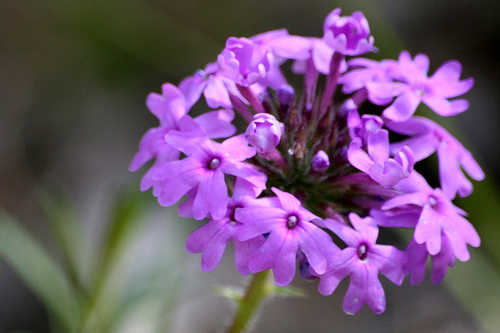
Rose Vervain, Verbena canadensis.
(*photo credit)
April 23, 2011
Holy Saturday: Rising as Lord of All
After
the liturgical roller-coaster of the last two days we pause to catch our
breath. We are gaining the strength to celebrate the upcoming Easter event. In
preparation, we take the tried and true spiritual advice of reviewing where we
have come from. The seemingly chosen aspects of the Holy Thursday event are
simply to prepare us for a mission that is difficult, but needed to help save
our troubled world.
Let's
return to what we said on January 9th. The winding Babel tower twists the
Divine Command, and this twisted image hangs over us still. This man-made
structure overshadows a divided world, with individuals seeking exclusive
privileges rather than sharing the gifts of God with all. Economic and
political theories have been concocted to defend an exclusive privilege that
really belongs to God alone. These competing islands of self-interest have
brought strife on family, community, tribal and national levels -- and they
plague us still. Jews, Christians, and Muslims have often misinterpreted the
message; they have considered themselves as exclusively chosen for
self-possessing privileges of fame, fortune, or power, or special honors.
Those
misguided in the name of religion place an "inclusive" privilege as being apart
from others, or mistakenly in idols that support their retention of certain
privileges. They dare not tell the truth that they have determined to worship
idols instead of the one God; their materialism includes an "exclusive" desire
to put "all for me, and me for me." They seek to justify large tracts of land
in the control of billionaires; they forget there is a limited pie in this
world, no matter how much they boast that others can make that pie big enough to
incorporate their own selfishness. The economic/political world confronts the
true nature of the Calvary/Resurrection event. Jesus who dies for us and rises
for us is a covenant of the people, the light of the nations, to open the
eyes of the blind, to bring out prisoners from confinement, and from the
dungeon, those who live in darkness (Isaiah 42:6-7). The Lord's dying and
rising now becomes an unfolding mystery, in which we enter through our baptism.
Easter
calls us to abandon the materialistic stance of the world and take on that of
Jesus. Our mission is to die with him and rise with him, something exclusively
individual but only so that we can enter a community of believers who help the
Savior to save others. We now understand the exclusive demand to worship one
God alone; we now understand the inclusive calling given to all people, to
become instruments to bring about this emerging unity, namely the "Kingdom of
God." Our divine leader goes ahead of us as light to all and Lord of all. The
mission given to us is godly participation.
Prayer:
Lord, help us to understand the continued divine mission to proclaim you as Lord
of all, and allow us to be Easter people called to help bring about your glory.
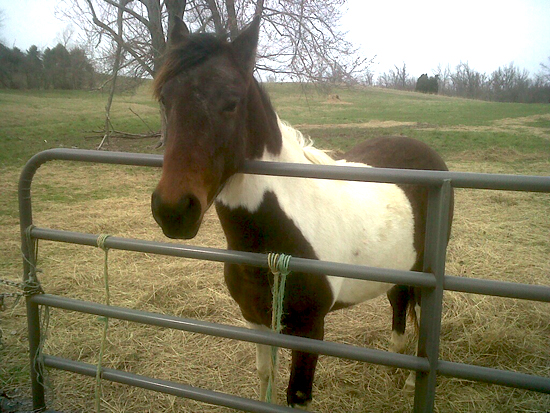
Bell, two years of age. Calvert City, KY.
(*Photo by Silas W. Traylor)
April 24, 2011
Proclaiming Easter Past, Future, and Present
Today is a new day: Christ has risen;
Christ will come again to usher us to eternal life; Christ comes now to all
believers. Our hearts are filled through faithful recall, through hopeful
promise, and through present joy.
Faith
in Easter past. We are caught up in the excitement of Peter and John and
Mary Magdalene, and through the years that excitement and enthusiasm means that
we enter into the Easter event as fully as did those early disciples. Easter
faith is that continuation of an historic event, witnessed by some who passed on
their testimony to us down through the ages as a sacred trust. Christ is now
Lord of New Life -- a new title.
Faith in Easter future.
We are swept into the excitement of Easter because it is more than a past sacred
event; Easter announces a future for all who believe. Down through the ages
Followers hope for the time when they will enter into the resurrection event
fully when ushered into eternal life -- a blessing that extends our mortal birth
and the life we are living. How precious is that life, and yet we anticipate
our promised eternal life -- a rising in victory over death, and the awaited
glory of a new dawn beyond the horizon of darkness and present troubles. This
event that is to come gives us courage, and also energizes us to face the
present moment.
Faith
in Easter present. Today, we celebrate the victory of Christ over death,
his victory and ours as well. We are invited into the divine family, and thus
the graciousness of God extends that past event of his resurrection into a life
to come for us; this is a joy that we can begin living that life here and now.
How do we respond to what has been given except through sharing this with
others? Namely, we share the event of the past and the promise of the future --
and both our faith and our hope become a joyful, loving, present moment. We
express that event and that promise through our enthusiasm for the risen Lord
within us. Each of us can help give new life to others; we forgive them in
loving solidarity within our troubled human family. We invite them to believe
and to journey together towards an eternal horizon.
New
life. Within this atmosphere of forgiveness we are able to start again, to
begin over in joy, to help bring about a new creation, to express a
"Resurrection-Centered Spirituality." We CAN heal our Earth; we CAN make life
better for others; we CAN be better ourselves and be involved in the ongoing
Easter event. We are sensitive to the ongoing Calvary of wounded Earth and
people; we are enabled by the power of the risen Lord in this ongoing Easter
event. Both a compassionate sensitivity and a powerful promise of ultimate
victory energize us today. Thus we live the present Easter moment in its full.
Prayer:
Lord, make us Easter people; help us rise to the present moment and make Easter
an event to heal a wounded world.
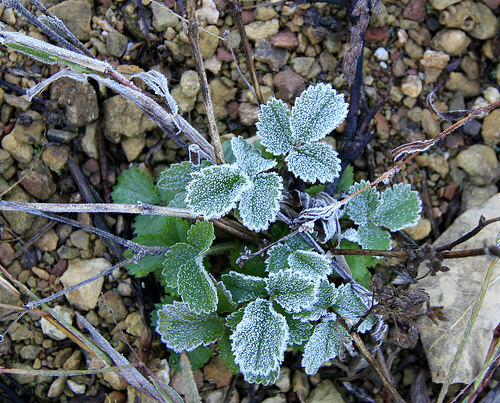
April frost in Kentucky.
(*photo credit)
April 25, 2011
Reflecting on Time: Past, Future, and Present
Easter
Sunday opens us to reflect on Easter time or even time itself. Shouldn't all
time-related discussions be in the traditional sequence of past, present, and
future? Maybe it is time to discuss the topic of the "philosophy" of time.
Easter is today, but embraces the past event and the future promise. Our today
is a past and a future; we look at the past to find a meaning as to where we
are, then to the future as the promise of where we are heading; finally, we
return to the present while weighing the future's significance in light of the
past. Easter is more than recalling the past and anticipating the future. If
we create our future we must find our direction from the past, and thus we are
aware of this present moment. The promise becomes partly fulfilled insofar as a
magnet pulls us to the future and a past energizes this magnetic power. Yes,
Easter makes our today meaningful.
Doesn't
the manner in which we announce the sequence create a straightjacket on our
outlook? The sequence of past, present, and future has a somewhat passive
aspect to it. We become the heirs of the past, live in the present, and prepare
for the future. There is the slavishness of trying to adopt an orchestral
approach to time, as though we live shaped by a past and move on sullenly into
the future. Yes, there is a bias shown in my describing this approach, for I
conceive of it as an example of "lite faith" -- a faith that finds some meaning
in following the past in its precision, and never allowing ourselves to become
creative. We know from Jesus' teaching that we must grow in a maturing faith.
By
placing the future immediately after the past we give it an existential value,
insomuch as it gives us enthusiasm to be drawn forward. The future in respect
to the past is making the past meaningful; our history enters into the way we
see ahead to what lies in our future, a future we help create through our
enthusiasm -- the God within. We are spiritually drawn to the future, and thus
we find the magnetic pull as beyond us and yet within us. By affirming the
spirit of the past, we incorporate it, and this is the spirit that gives the
promise of new life. Our future is affirmed in respect for and faithfulness to
our past.
A
faithful acceptance of the past in its eternal potential allows us an eternal
future. If Easter is the fullness of God's lordship, then in Easter past comes
an eternal future, and so that future stands next to the past in proper
sequence. In affirming past and future we live the present moment (that
precious instant between past and future), when recall drives us forward in the
present moment. Elders increasingly recognize the limited nature of the present
moment and strive to make the best of it. Our fleeting present is a meaningful
past seeking an achievable future. But as our mortal future narrows, the
present should receive added attention.
Prayer:
Lord, you came; you will come; you are here and now. Help us to make our past
and future ever here and now.
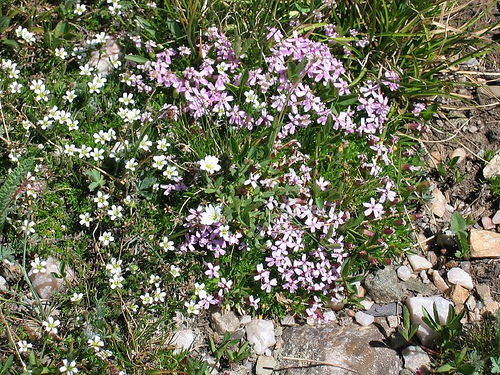
Vivid colors of springtime bouquet.
(*photo credit) April 26, 2011
Demonstrating the Existence of God through Love
My
dear people, let us love one another since love comes from God and everyone who
loves is begotten by God and knows God. Anyone who fails to love can never have known God, because God is love. (I John 4:7-8)
At
Easter time we reflect on our loving God who gives us the grace of eternal
life. Not too long ago, I prayed to God so that I might be able to love others
--and God gave me a glimpse of the divine love that overwhelms the world. Why
speak about this, except that so many seek rational explanations for all things
-- and, being confronted by so-called atheists, this makes us seek ways to speak
to them about God. However, our speech does not have to be formal discourse; if
the other party is deeply philosophical, perhaps rational proofs are
beneficial. Our focus must be to where people actually are -- and many have
informal, love-hate struggles in their journey of faith.
The letter by John quoted
above is quite significant in our day-to-day discussions of God's presence to
ordinary people. John tells us that those "know" God who love, and those do not
"know" God who fail to love. Interesting! This means that love is the key to
our spiritual wisdom when it comes to articulating our relationship to God.
Some folks are not good articulators, for they lack a special gift of words.
However, does this mean that they cannot speak about God's existence? Hardly!
Love is at the heart of all we are and do; if one loves, then what is expressed
is that love that includes compassion for others who suffer in some way.
Through suffering with another we show love, and express it in a way that the
suffering person understands -- heart to heart.
While
not disparaging rational proofs for the existence of God, we still are left with
the fact that such proofs may be somewhat sterile for the loving and
compassionate servers of the Lord. A failure to express in words may be far
more than compensated by a loving service that speaks louder than words. What
this loving service does is extend the love of our hearts to others, and through
loving others we show that Love is a person. To the degree that we love others,
we are faithful and we are godly. Why godly? Because God IS love.
Thank God we have occasions
to connect with atheists, for they make us look for shared beliefs. We have
much in common with loving people, for they are on the road to coming closer to
God. Some people come to God through rational understanding and discourse;
however, they still do not know God unless they love. We cannot talk about God
to a person who hates others. It is impossible. If they love, then their love
is eternal and can never to be erased; we affirm that they are on the road to
knowing God.
Prayer:
Lord, help us to bring others to you, not in the straightjacket of formal
rational discourse, but through the far more liberating act of loving from the
depth of our hearts.
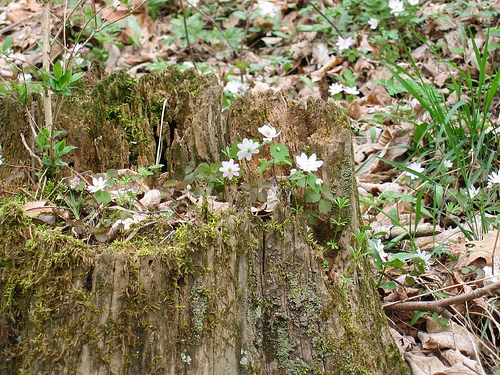
Stump becomes home to native Kentucky plants.
(*photo credit)
April 27, 2011
Earthhealing through the Basic Component of Love
God is love and extends
love. That love is especially shown to angels and to human beings, both created
in the image of God in special ways. Does God love all of creation? Of course,
says a youth who is quite fond of his or her pup or kitten. Such truth can
hardly be denied. God loves all creation, for these -- in different ways than
from us -- are also made to the divine likeness. When we search quite deeply we
find that all creation tells something of the glory of God, and with reflection
we find traits of humility, generosity, beauty, and more in different parts of
creation, whether dolphins or flowers. We find a loving hand of the Creator in
the marvelous works around us. Yhwh, our Lord, how great your name
throughout the Earth! (Psalm 8:1)
God's
love of creation permeates all things and binds all things together. We humans
can strive to break through our greed and selfishness; we try to be gods with
our own attempts at fame and fortune. Misdeeds abound, and they harm our
fragile Earth. When we seek to love God all the more, and others who are part
of our human family, we soon see the potential for misdeeds affecting the human
community; when we look deeply we see that those misdeeds can damage other
parts of creation as well.
We
pray to love as God loves others. That is our deep desire, and one that God
surely always answers -- for God is merciful to us who seek to love. We see the
love of God being shown by the generosity of honest neighbors and, with special
grace, by our own deeds as well. Within this insight of the mixture of good
deeds and misdeeds is included the need for healing. Thus the impulse to heal
comes in an atmosphere of divine love extended to us. We seek to heal because
we love; we want to return the loveliness of creation to what has been made
ugly. In essence, a resurrection-centered spirituality calls us to love.
Why
have we failed so utterly in responding to this love of God? Why do we do wrong
things when we ought to do good things -- and thus are weighed down by our
misdeeds? The bringing of these to light is part of God loving us deeply. The
weaknesses of our past misdeeds haunt us, and yet ever so slowly we learn that
God's mercy is forgiving; while unable on our own to repair what we have
damaged, we are invited to try. In being called to be earth- healers of our
wounded Earth, we find this a loving invitation; seeing this is the beginnings
of a resurrection-centered spirituality. We are called to do what we can and
love what we can. We are the first generation to sense the harm to Earth that
we have caused through selfish lifestyles, and failure to check the harm done by
others. If we love our Earth, we will strive to halt the abuse, diagnose the
damage, propose a healing process, and launch the proper treatment with the help
of others,.
Prayer:
Lord, teach us that healing is a godly act and that this draws on the deep
wells of your love for us. Help us overcome our misdeeds, and in your mercy to
become true healers.

Megaphasma denticrus, Giant Walking Stick.
(*photo credit)
April 28, 2011 Showing
Compassion for our Wounded Earth
In
an atmosphere of Compassion (see February 18 and March 28, 2007), we
focus on our fellow suffering human beings. However, to what realms does our
compassion reach? If our love extends to all creation, so must our compassion;
we are to be compassionate and to co-suffer with all who are wounded in any
way. The heart of this reflection series is that of healing what is wounded;
our Earth suffers from the misdeeds of human beings. Those who deny that
climate change is humanly-caused minimize the effects of these misdeeds, and do
a great disservice at this time. We take beyond our due; we fail to clean up
our messes; we allow the perpetrators of misdeeds to continue their dirty work,
even though a democratic society has power to call them to question.
Is
being compassionate for Earth and all creatures any different from that of
compassion for fellow human beings? When oil spills occur in Alaska or the Gulf
of Mexico we find generous people volunteering to wash off seagulls and
pelicans, even though only a few will survive the stress of the oil covering.
However, something meaningful is occurring on the part of the people who seek to
help. They manifest a sense of compassion for animals -- that is shown by many
to pets and strays. Compassion reaches to flora and fauna. I remember my
mother accidentally disturbing a nest of young birds while clipping her rose
trellis, and saying (without knowing I overheard her), "You poor little
things." It impressed me in all my callous youth, when I hardly thought animals
were of much value. However, compassion was being expressed and being taught --
and needs to be given today. Some primitive peoples ask pardon from the animals
they harvest for food; others speak to their animal companions as though human.
People show compassion to
plants, though these less sensate creatures have less ability to respond.
Sometimes when we water a thirsty garden, we can almost hear the plants begging
for a drink -- or at least our imaginations are triggered on seeing the wilted
condition of the drooping leaves. Certainly the plants are stressed, even
though they do not "suffer" in a technical sense. In this manner of being part
of creation to the degree that we feel the stress on a forest or eroded
landscape, we enter into a sense of extended compassion for the wounded or needy
party.
We
are exercising compassion to and with our wounded Earth and hear the crucified
Jesus say, "See what they have done to my wounded Earth!" He dies for those who
have done the misdeeds; all the more, he dies for all the victims. Our mission
as Christians is to spread the Good News -- and part of that News is that joy in
this world must be mixed with compassion. Calvary and Easter become a coupled
event. We need to heal our Earth, but we can only do so if we have a prior
sense of "Earth pain" -- something Jesus endures on the cross. We can likewise
endure this when suffering the misdeeds to our fragile Earth.
Prayer:
Lord, teach us compassion for all creatures.
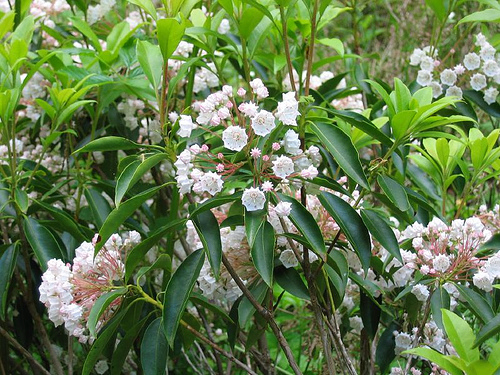
Mountain laurel, Kalmia latifolia.
(*photo credit)
April 29, 2011
Recounting That We are Easter People
What
are the characteristics that make us who we are? My suspicion is that the
following reflection will not do justice to this fertile subject. Each Easter I
reflect again -- and suspect that by comparing these attempts we can find some
hint as to the progress of our appreciation of the Easter mystery.
Easter
people taste victory. For the believer, Easter means the victory of Christ
over death, and that the ignominy of the cross has been overcome. Death, where
is your victory? Where is your sting? Jesus has suffered and died for us and
now, as Lord of the universe, Jesus is the first to rise and go ahead of us. We
glory in his victory and that gives us immense happiness.
Easter
people smell the freshness of new life. The Easter season gives us added
joy that comes after a long Lenten season. For those of us in the temperate
northern hemisphere, the winter harshness has ended for a period, and we are now
liberated. We can wear less and lighter-weight clothing, and we can breath
deeply the freshness and sunshine of spring. For us, Easter means new life --
and all life is a blessing and a mystery in itself. Thus for us, resurrection
as new life makes us ever more aware of being pro-life from the womb to old age,
from the human to the animal and plant worlds as well. But Easter is more than
a physical seasonal change and an appreciation of life stretches out to new
life.
Easter people see a
horizon of promised eternal life. Only when we compare the comfort that
comes to a dying believer, do we know what faith can do for others. An absolute
darkness and void does not await us, as is expected by those who call themselves
atheists, no matter how stoic they are about their own impending end. Their
emptiness makes us feel a tinge of sorrow that they have no future to await, a
future of unending happiness. The Lord's resurrection gives us this promise of
eternal life, and fills us with a spiritual joy that is indescribable to the
non-believer. This state of joy encourages us to show continual gratitude for
the gift of life itself.
Easter
people hear a chorus of joy. The Easter songs ring out for us. Easter is a
season when we invite others into our community so that they too may experience
"The Ode to Joy."
Easter
people feel this as a time of blessings. We can show our thankfulness for
life by blessing all life with Easter water. We move about all to which we come
near --pets, livestock, wildlife, garden, fields, trees, flowers, people, and on
and on. By sprinkling Easter water we show that we regard all creation as a
blessing, and our encounters as a double blessing.
Prayer:
Lord, through faith and baptism we have become a new creation. Give us the
strength to show a tired world that it is capable of new life. Strengthen our
enthusiasm so that we can bring this Good News to others.
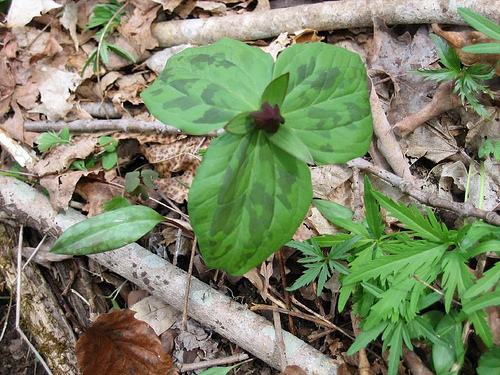
Trillium sessile. Franklin Co., KY.
April 30, 2011 Accepting
the Challenge of Creative Writing
I
have a friend who I try to prod to start up writing again, since a book he wrote
three decades ago showed great talent. But how can I encourage him to pick up
the pen and put down his thoughts so others can interact with him? Isn't
springtime as good as any to start writing, especially when making a retreat or
vacationing? Actually, any time can be a writing season, if we refrain from our
artificial busyness and the practice of average Americans who watch thirty-five
hours of TV a week. Think about this challenge! You can become creative, even
if only you are satisfied with what you create. However, it is always more
fulfilling to share with others through a social network, so that the creativity
can be encouraged through positive feedback.
None of us are experts on a wide variety of subjects, nor are we expected to
be. Nor are we usually top experts in any field -- but that should not deter
us. Our friends are always looking for something more in life, and we may be
the ones who can help them. Experts may be good at some things, but lack the
ability to communicate to this person at this time. We have unique talents, and
writing can be the perfect opportunity to make contact. Our writings can become
the instrument of spreading Good News within the human family, especially when
we use the available Internet. We can grow together through a dynamic
interrelationship involving healing and being healed, learning and teaching. In
healing our Earth, our Earth heals us. Our writings ought to become a record of
our journey in the healing process.
Writers
must be faithful to themselves; let the writing spring up naturally devoid of
pretention. We cannot preach a grand sermon to ourselves, nor expect to reach a
full depth of effectiveness with all readers. We cannot possibly settle all
controversies local or distant. We create the draft copies of what will be
finished over time through interchange with others and through deepening
individual reflection. Fresh subjects can be introduced, but they await ongoing
reflection, especially in such turbulent times as these. We cannot possibly do
all we want to do at one sitting, nor ought we to try. One issue is enough for
the moment, but it awaits ongoing probing and further adjustments.
Should
our writing draw from local or global issues? Much depends on our immediate
inspiration. We need not be restricted in our outlook, whether a more
"catholic" view, or a personally-related occasion or situation. The challenge
is always to do both, and to recall that Sacred Scriptures, interesting
biographies, great novels, and superior poetry often contain both local personal
and global aspects. We seek to be clear, to avoid condescension, and to be
inviting. Let's regard anything that we write as an act of profound sharing.
Thank God that we still have breath and the ability to write down our
reflections.
Prayer:
Lord, instruct us in what to say, so that we can learn to pray while writing,
and encourage others to do the same.
|